Of studies原文译文及赏析教学提纲
培根“Of Studies”的两个译本赏析
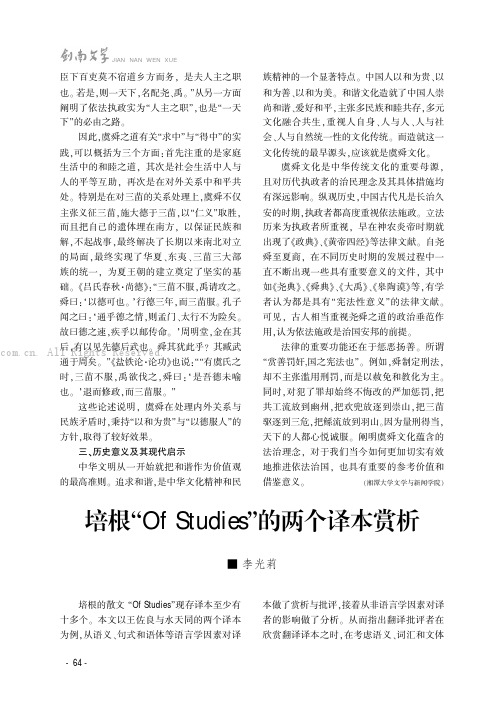
JIAN NAN WEN XUE臣下百吏莫不宿道乡方而务,是夫人主之职也。
若是,则一天下,名配尧、禹。
”从另一方面阐明了依法执政实为“人主之职”,也是“一天下”的必由之路。
因此,虞舜之道有关“求中”与“得中”的实践,可以概括为三个方面:首先注重的是家庭生活中的和睦之道,其次是社会生活中人与人的平等互助,再次是在对外关系中和平共处。
特别是在对三苗的关系处理上,虞舜不仅主张义征三苗,施大德于三苗,以“仁义”取胜,而且把自己的遗体埋在南方,以保证民族和解,不起战事,最终解决了长期以来南北对立的局面,最终实现了华夏、东夷、三苗三大部族的统一,为夏王朝的建立奠定了坚实的基础。
《吕氏春秋·尚德》:“三苗不服,禹请攻之。
舜曰:‘以德可也。
’行德三年,而三苗服。
孔子闻之曰:‘通乎德之情,则孟门、太行不为险矣。
故曰德之速,疾乎以邮传命。
’周明堂,金在其后,有以见先德后武也。
舜其犹此乎?其臧武通于周矣。
”《盐铁论·论功》也说:““有虞氏之时,三苗不服,禹欲伐之,舜曰:‘是吾德未喻也。
’退而修政,而三苗服。
”这些论述说明,虞舜在处理内外关系与民族矛盾时,秉持“以和为贵”与“以德服人”的方针,取得了较好效果。
三尧历史意义及其现代启示中华文明从一开始就把和谐作为价值观的最高准则。
追求和谐,是中华文化精神和民族精神的一个显著特点。
中国人以和为贵、以和为善、以和为美。
和谐文化造就了中国人崇尚和谐、爱好和平,主张多民族和睦共存,多元文化融合共生,重视人自身、人与人、人与社会、人与自然统一性的文化传统。
而造就这一文化传统的最早源头,应该就是虞舜文化。
虞舜文化是中华传统文化的重要母源,且对历代执政者的治民理念及其具体措施均有深远影响。
纵观历史,中国古代凡是长治久安的时期,执政者都高度重视依法施政。
立法历来为执政者所重视,早在神农炎帝时期就出现了《政典》、《黄帝四经》等法律文献。
自尧舜至夏商,在不同历史时期的发展过程中一直不断出现一些具有重要意义的文件,其中如《尧典》、《舜典》、《大禹》、《皋陶谟》等,有学者认为都是具有“宪法性意义”的法律文献。
Of studies 译文赏析
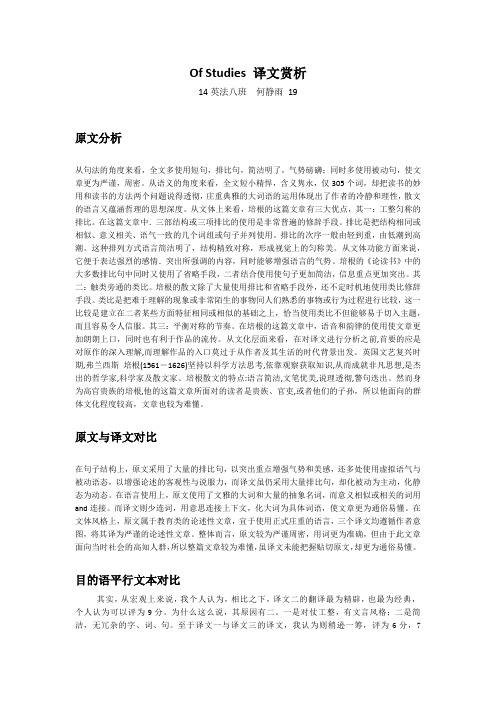
Of Studies 译文赏析14英法八班何静雨19原文分析从句法的角度来看,全文多使用短句,排比句,简洁明了,气势磅礴;同时多使用被动句,使文章更为严谨,周密。
从语义的角度来看,全文短小精悍,含义隽永,仅305个词,却把读书的妙用和读书的方法两个问题说得透彻,庄重典雅的大词语的运用体现出了作者的冷静和理性,散文的语言又蕴涵哲理的思想深度。
从文体上来看,培根的这篇文章有三大优点,其一:工整匀称的排比。
在这篇文章中.三部结构或三项排比的使用是非常普遍的修辞手段。
排比是把结构相同或相似、意义相关、语气一致的几个词组或句子并列使用。
排比的次序一般由轻到重,由低潮到高潮。
这种排列方式语言简洁明了,结构精致对称,形成视觉上的匀称美。
从文体功能方面来说,它便于表达强烈的感情.突出所强调的内容,同时能够增强语言的气势。
培根的《论读书》中的大多数排比句中同时又使用了省略手段,二者结合使用使句子更加简洁,信息重点更加突出。
其二:触类旁通的类比。
培根的散文除了大量使用排比和省略手段外,还不定时机地使用类比修辞手段。
类比是把难于理解的现象或非常陌生的事物同人们熟悉的事物或行为过程进行比较,这一比较是建立在二者某些方面特征相同或相似的基础之上,恰当使用类比不但能够易于切入主题,而且容易令人信服。
其三:平衡对称的节奏。
在培根的这篇文章中,语音和韵律的使用使文章更加朗朗上口,同时也有利于作品的流传。
从文化层面来看,在对译文进行分析之前,首要的应是对原作的深入理解,而理解作品的入口莫过于从作者及其生活的时代背景出发。
英国文艺复兴时期,弗兰西斯培根(1561―1626)坚持以科学方法思考,依靠观察获取知识,从而成就非凡思想,是杰出的哲学家,科学家及散文家。
培根散文的特点:语言简洁,文笔优美,说理透彻,警句迭出。
然而身为高官贵族的培根,他的这篇文章所面对的读者是贵族、官吏,或者他们的子孙,所以他面向的群体文化程度较高,文章也较为难懂。
OfStudies(原文+三种译文)
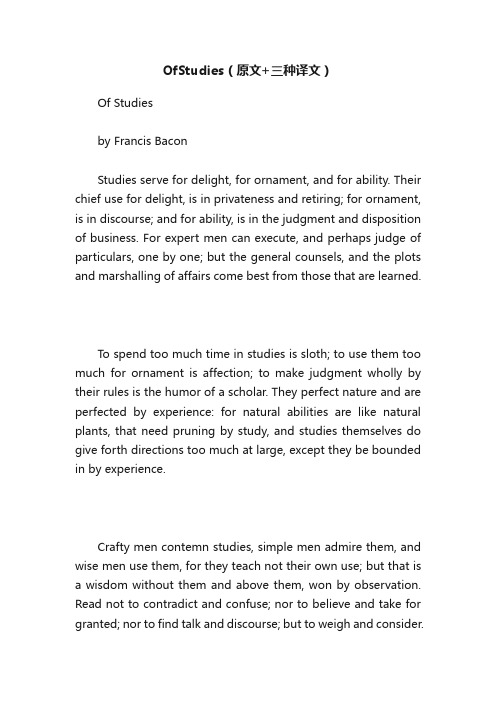
OfStudies(原文+三种译文)Of Studiesby Francis BaconStudies serve for delight, for ornament, and for ability. Their chief use for delight, is in privateness and retiring; for ornament, is in discourse; and for ability, is in the judgment and disposition of business. For expert men can execute, and perhaps judge of particulars, one by one; but the general counsels, and the plots and marshalling of affairs come best from those that are learned.To spend too much time in studies is sloth; to use them too much for ornament is affection; to make judgment wholly by their rules is the humor of a scholar. They perfect nature and are perfected by experience: for natural abilities are like natural plants, that need pruning by study, and studies themselves do give forth directions too much at large, except they be bounded in by experience.Crafty men contemn studies, simple men admire them, and wise men use them, for they teach not their own use; but that is a wisdom without them and above them, won by observation. Read not to contradict and confuse; nor to believe and take for granted; nor to find talk and discourse; but to weigh and consider.Some books are to be tasted, others to be swallowed, and some few to be chewed and digested; that is some books are to be read only in parts; others to be read, but not curiously; and some few to be ready wholly, and with diligence and attention. Some books also may be read by deputy and extracts made of them by others; but that would be only in the less important arguments, and the meaner sort of books; else distilled books are, like common distilled waters, flashy things.Reading makes a full man; conference a ready man; and writing an exact man. And therefore, if a man write little, he had need have a great memory; if he confer little, he had need have a present wit; and if he read little, he had need have much cunning to seem to know that he doth not.Histories make men wise; poets witty; the mathematics subtle; natural philosophy deep; moral grave; logic and rhetoric able to contend. Abeunt studia in mores. Nay there is no stond or impediment in the wit, but may be wrought out by fit studies: like as diseases of the body may have appropriate exercises. Bowling is good for the stone and reins; shooting for the lungs and breast; gentle walking for the stomach; riding for the head; and the like. So if a man’s wit be wandering, let him study themathematics; for in demonstrations, if his wit be called away never so little, he must begin again. If his wit be not apt to distinguish or find differences, let him study the schoolmen; for they are symini sectores. If he be not apt to beat over matters, and to call up one thing to prove and illustrate another, let him study the lawyers’ cases. So every defect of the mind may have a special receipt.【译文】一、王佐良译:谈读书读书足以怡情,足以傅彩,足以长才。
Of_Studies_(英汉对照)
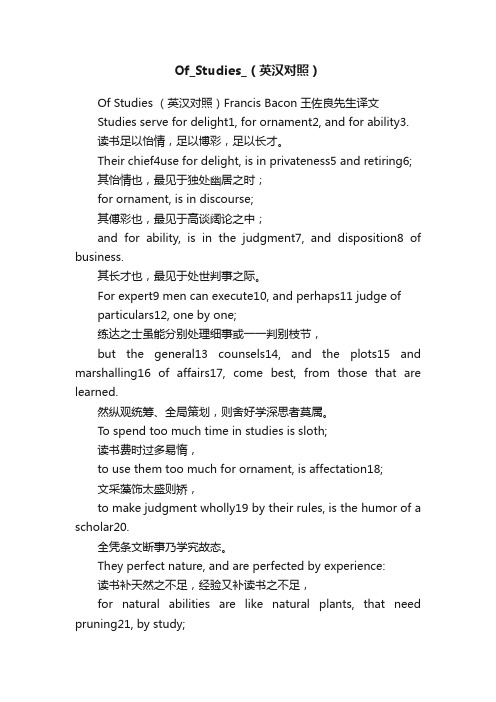
Of_Studies_(英汉对照)Of Studies (英汉对照)Francis Bacon王佐良先生译文Studies serve for delight1, for ornament2, and for ability3.读书足以怡情,足以博彩,足以长才。
Their chief4use for delight, is in privateness5 and retiring6;其怡情也,最见于独处幽居之时;for ornament, is in discourse;其傅彩也,最见于高谈阔论之中;and for ability, is in the judgment7, and disposition8 of business.其长才也,最见于处世判事之际。
For expert9 men can execute10, and perhaps11 judge ofparticulars12, one by one;练达之士虽能分别处理细事或一一判别枝节,but the general13 counsels14, and the plots15 and marshalling16 of affairs17, come best, from those that are learned.然纵观统筹、全局策划,则舍好学深思者莫属。
To spend too much time in studies is sloth;读书费时过多易惰,to use them too much for ornament, is affectation18;文采藻饰太盛则矫,to make judgment wholly19 by their rules, is the humor of a scholar20.全凭条文断事乃学究故态。
They perfect nature, and are perfected by experience:读书补天然之不足,经验又补读书之不足,for natural abilities are like natural plants, that need pruning21, by study;盖天生才干犹如自然花草,读书然后知如何修剪移接;1. delight [di'lait] n. 高兴2. for ornamental [,?:n?'ment?l] adj. 装饰的,装饰性的装饰门面,显示才学3. ability [?'biliti]n. 能力,能耐;才能4. chief [t?i:f]adv. 主要地;首要地5. privateness n. 私人性6. retiring 幽居7. judgment ['d??d?m?nt]n. 判断;判决书;辨别力8. disposition [,disp?'zi??n]n. 处置;[军] 部署9. expert ['eksp?:t, ek'sp?:t] adj. 熟练的;老练的10. execute ['eksikju:t]vt. 实行;执行;处死11. perhaps [p?'h?ps, pr?ps] adv. 也许;可能12. particulars [p?'tiku:l?z]n. 细节;详情13. general ['d?en?r?l]adj. 一般的,普通的14. counsel ['kauns?l] 报错n. 法律顾问;忠告;讨论15. plot [pl?t] n. 情节;阴谋16. marshalling ['mɑ:??li?]v. 整理(marshall的ing形式)17. affair [?'fε?] n. 事情;事务;18. affectation [,?fek'tei??n]n. 做作;矫揉造作;假装19. wholly ['h?uli]adv. 完全地;全部;统统20. scholar ['sk?l?]n. 学者;儒生21. pruning ['pru:ni?]v. 修剪(prune的ing形式)22. direction [di'rek??n, dai-]n. 方向;指导;23. bounded ['baundid]adj. 有界限的and studies themselves, do give forth directions22 too much at large, except they be bounded23 in by experience.而书中所示,如不以经验范之,则又大而无当。
Of Studies译文对比赏析5页word

Of Studies译文对比赏析一、原作写作风格Of Studies的语言风格和现代英语颇为不同。
与时文相比,它显得有点像古文。
全文以读书(study)为中心展开讨论,环环相扣,意思逐层递进。
文字精炼,语言简约、潇洒、比喻恰当,富于想象力,处处透露出美感与智慧,说服力十足,论断分明,尤以富含哲理的名言警句见长,字里行间饱含自信。
不时结合使用拉丁文,使文章带有古香古色的韵味,书卷气十足。
二、对比分析严复提出翻译要做到信、达、雅,对于散文,我认为译者在做到信、达的同时,更要注重雅。
在通篇的行文上,要追求风格的一致性。
如前文所言,该散文语言精炼,文章短小精悍,所以翻译的难处在于再现语言简约优美风格的同时又不失其说服力,实现刚和柔的完美结合。
在此,我将挑选王佐良和廖运范的译文(以下简称为王译和廖译)来作比较分析。
1.对比一下两篇译文的风格王译采用半文半白的语言形式,四字词的使用频率高,语言简洁,与原文的风格十分接近,而廖译则用现代汉语的形式,使文章显得十分通俗易懂。
如果按照奈达所提倡的意义的对应必须优先于文体上的对应这一言论来分析这两篇译文,那么这两篇译文都忠实于原文,在读者中产生的效应是相当的。
但是,若按照科勒提出的对等观点来研究翻译对等和等效的问题,那么王译就脱颖而出了。
科勒所提出的除了外延对等(denotativeequivalence),主要研究词汇方面;还包括内涵对等(connotative equivalence),即文体对等,关注文体效果,古体的或是平实的;语篇规约对等(text-normative equivalence),关注不同交际场景的用法;语用对等(pragmatic equivalence),指为特定的读者群进行翻译和形式对等(formal equivalence),针对的是韵律、隐喻和其他修辞手法的对等。
王译在做到词汇、文章意义对等的同时,采用半古文的形式,凸显了文体风格的对等,译文中再现原文的排比句和其他的修辞手法,实现了翻译的形式对等。
培根的《论读书》OfStudies(原文和译文)
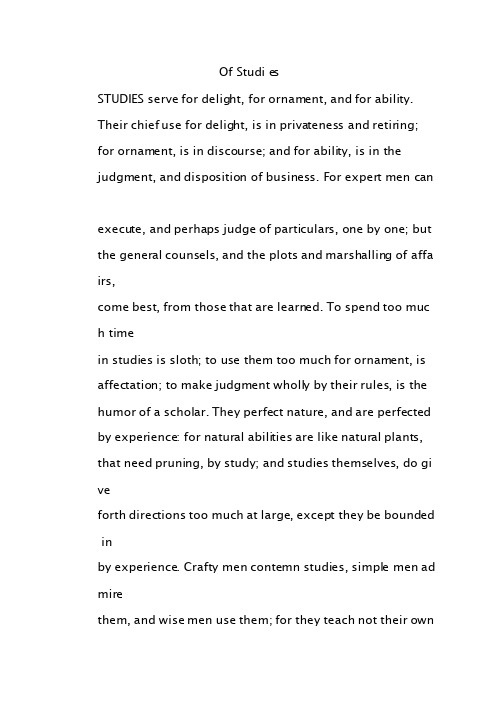
Of Studie sSTUDIE S servefor deligh t, for orname nt, and for abilit y. Theirchiefuse for deligh t, is in privat eness and retiri ng; for orname nt, is in discou rse; and for abilit y, is in the judgme nt, and dispos ition of busine ss. For expert men canexecut e, and perhap s judgeof partic ulars, one by one; but the genera l counse ls, and the plotsand marsha lling of affa ir s,come best, from thosethat are learne d. To spendtoo muc h timein studie s is sloth; to use them too much for orname nt, is affect ation; to make judgme nt wholly by theirrules, is the humorof a schola r. They perfec t nature, and are perfec ted by experi ence: for natura l abilit ies are like natura l plants, that need prunin g, by study; and studie s themse lves, do gi veforthdirect ionstoo much at large, except they be bounde d inby experi ence. Crafty men contem n studie s, simple men ad mirethem, and wise men use them; for they teachnot theirownbut that is a wisdom withou t them, and abovethem, won b yobserv ation. Read not to contra dictand confut e; nor to beli ev eand take for grante d; nor to find talk and discou rse; but to weighand consid er. Some booksare to be tasted, others t o beswallo wed, and some few to be chewed and digest ed; that i s,some booksare to be read only in parts; others to be read,but not curiou sly; and some few to be read wholly, and wit hdilige nce and attent ion. Some booksalso may be read by d eputy,and extrac ts made of them bother s; but that wouldbe only inthe less import ant argume nts, and the meaner sort of book s,else distil led booksare like common distil led waters, flashyReadin g make a full man; confer encea readyman; and writ in gan exactman. And theref ore, if a man writelittle, he had need have a greatmemory; if he confer little, he had need have a presen t wit: and if he read little, he had need have much cunnin g, to seem to know, that he doth not. Histor ie smake men wise; poetswitty; the mathem atics subtit le; nat ura lphilos ophydeep; moralgrave; logicand rhetor ic able to co nten d.Abeunt studia in mores. Nay, thereis no standor impedi m entinthe wit, but may be wrough t out by fit studie s; like as diseasesof the body, may have approp riate exerci ses. Bowlin g is go od forthe stoneand reins; shooti ng for the lungsand ***; gentle walkin g for the stomac h; riding for the head; and the like. Soif a man's wit be wander ing, let him studythe mathem atics ; forin demons trati ons, if his wit be called away neverso little, he must beginagain. If his wit be not apt to distin guish or find differ ences, let him studythe School men; for they are Cymini sector s. If he be not apt to beat over matter s, and tocall up one thingto proveand illust rateanothe r, let him st udythe lawyer s' cases. So everydefect of the mind, may have a specia l receip t.论读书王佐良译读书足以怡情,足以傅彩,足以长才。
Of Studies (英汉对照)

Of Studies (英汉对照)Of Studies 王佐良先生译文(英汉对照)STUDIES serve for delight, for ornament, and for ability.读书足以怡情,足以博彩,足以长才。
Their chief use for delight, is in privateness and retiring; (a retiring room 休息室)其怡情也,最见于独处幽居之时;for ornament, is in discourse;其傅彩也,最见于高谈阔论之中;and for ability, is in the judgment, and disposition部署of business.其长才也,最见于处世判事之际。
For expert men can execute, and perhaps judge of particulars, one by one;练达之士虽能分别处理细事或一一判别枝节,but the general counsels, and the plots and marshalling of affairs, come best,from those that are learned.然纵观统筹、全局策划,则舍好学深思者莫属。
To spend too much time in studies is sloth;读书费时过多易惰,to use them too much for ornament, is affectation;文采藻饰太盛则矫,to make judgment wholly by their rules, is the humor怪僻的行为of a scholar.全凭条文断事乃学究故态。
They perfect nature, and are perfected by experience:读书补天然之不足,经验又补读书之不足,for natural abilities are like natural plants, that need pruning, by study;盖天生才干犹如自然花草,读书然后知如何修剪移接;and studies themselves, do give forth directions too much at large, except theybe bounded in by experience.而书中所示,如不以经验范之,则又大而无当。
Of-studies原文译文及赏析说课材料
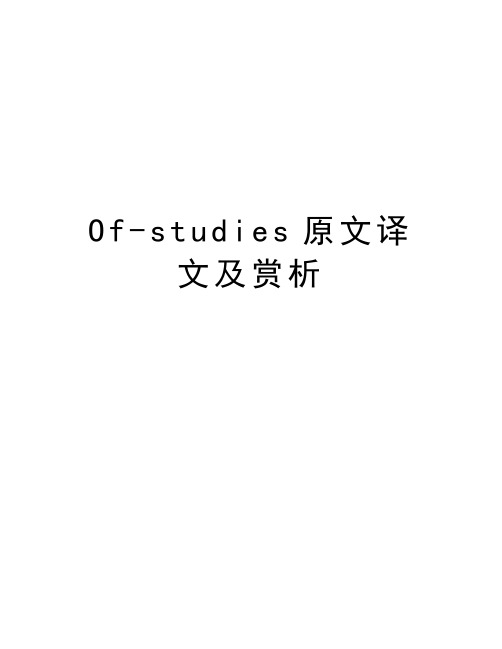
O f-s t u d i e s原文译文及赏析培根Of Studies原文及三个版本的汉译【原文】Studies serve for delight, for ornament, and for ability. Their chief use for delight, is in privateness and retiring; for ornament, is in discourse; and for ability, is in the judgment and disposition of business. For expert men can execute, and perhaps judge of particulars, one by one; but the general counsels, and the plots and marshalling of affairs come best from those that are learned.To spend too much time in studies is sloth; to use them too much for ornament is affection; to make judgment wholly by their rules is the humor of a scholar. They perfect nature and are perfected by experience: for natural abilities are like natural plants, that need pruning by study, and studies themselves do give forth directions too much at large, except they be bounded in by experience.Crafty men contemn studies, simple men admire them, and wise men use them, for they teach not their own use; but that is a wisdom without them and above them, won by observation. Read not to contradict and confuse; nor to believe and take for granted; nor to find talk and discourse; but to weigh and consider.Some books are to be tasted, others to be swallowed, and some few to be chewed and digested; that is some books are to be read only in parts; others to be read, but not curiously; and some few to be ready wholly, and with diligence and attention. Some books also may be read by deputy and extracts made of them by others; but that would be only in the less important arguments, and the meaner sort of books; else distilled books are, like common distilled waters, flashy things.Reading makes a full man; conference a ready man; and writing an exact man. And therefore, if a man write little, he had need have a great memory; if he confer little, he had need have a present wit; and if he read little, he had need have much cunning to seem to know that he doth not.Histories make men wise; poets witty; the mathematics subtle; natural philosophy deep; moral grave; logic and rhetoric able to contend. Abeunt studia in mores. Nay there is no stond or impediment in the wit, but may be wrought out by fit studies: like as diseases of the body may have appropriate exercises. Bowling is good for the stone and reins; shooting for the lungs and breast; gentle walking for the stomach; riding for the head; and the like. So if a man’s wit be wandering, let him study the mathematics; for in demonstrations, if his wit be called away never so little, he must begin again. If his wit be not apt to distinguish or find differences, let him study the schoolmen; for they are symini sectores. If he be not apt to beat over matters, and to call up one thing to prove and illustrate another, let him study the lawyers’ cases. So every defect of the mind ma y have a special receipt.Abeunt studia in mores: Studies pass into the characterSymini sectores: dividers of cumin seeds, or hair-splitters【译文】一、王佐良译:谈读书读书足以怡情, 足以傅彩, 足以长才。
Of_studies译文赏析
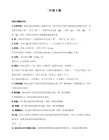
读史使人明智,读诗使人灵秀,数学使人周密,科学使人深刻,伦理学使人庄重,逻辑修辞之学使人善辩:凡有所学,皆成性格。人之才智但有滞碍,无不可读适当之书使之顺畅.
例如打球有利于腰背,射箭可扩胸利肺,散步则有助于消化,骑术使人反应敏捷,等等。同样道理,一个思维不集中的人,他可以研习数学,因为数学稍不仔细就会出错。缺乏分析判断的人,他可以研习而上学,因为这门学问最讲究细琐的辩证。不善于推理的人,可以研习法律案例。如此等等。这种心灵上的缺陷,都可以通过学习而得到改善。
Some books are to be tasted, others to be swallowed, and some few to be chewed and digested; that is, some books are to be read only in parts; others to be read, but not curiously; and some few to be read wholly, and with diligence and attention.
Of-Studies翻译与鉴赏演示教学

1摭(zhí):拾取/摘取(pick up; gather)
2傅:涂抹(如“傅粉”)
2
For expert men1 can execute 2, and perhaps judge of particulars3, one by one; but the general counsels4, and the plots, and marshalling of affairs5, come best from those that are learned.
4 counsel: something that provides direction or advice as to a decision or course of action忠告/劝告/建议
general counsel总的计划/大计
5plots: a secret scheme to do something (especially something underhand or illegal(秘密)计划/密谋/谋划/出谋划策
Of-Studies翻译与鉴赏
1
Studies serve for1 delight, for ornament2, and for ability.
Their chief use for delight, is in privateness and retiring3;
for ornament, is in discourse4; and for ability, is in the
1专家/能手/内行/阅历丰富的人 2 carry out/perform an action; to put into effect执行
of studies中英赏析

of studies中英赏析《论研究》是英国文学家培根(Francis Bacon)的一篇经典散文,它以对学习和研究的思考为主题,阐述了研究的重要性和方法。
本文旨在通过对《论研究》的中英赏析,探讨其思想内涵和艺术特点。
《论研究》一文由五个部分组成,分别是“阅读使人完善”、“交谈使人机智”、“写作使人严谨”、“思考使人深刻”和“各种学习方法的效果比较”。
整篇文章以简明扼要的语言,阐述了学习和研究的不同方式对于提高个人能力的重要作用。
文章提到阅读的重要性。
培根认为,阅读使人完善,开拓了人的眼界,丰富了知识储备。
他强调了对于书籍的选择要有所取舍,要选择经典著作和有深度的内容进行阅读。
通过阅读,人们可以获取到前人的智慧和经验,提高自己的见识和理解能力。
文章讲述了交谈的价值。
培根认为,交谈可以使人变得机智。
在与他人的交流中,人们不仅可以学到新的知识,还可以通过与他人的观点碰撞,提高自己的思维能力和逻辑思维能力。
同时,交谈也是一种锻炼表达能力和沟通能力的方式。
接着,文章提到了写作的重要性。
培根认为,写作使人变得严谨。
通过写作,人们可以把自己的想法和观点清晰地表达出来,从而更好地理清思路,提高自己的逻辑思维能力和表达能力。
同时,写作也是一种对于自己思考的检验,可以帮助人们发现自己的不足和问题,进一步提高自己的学术能力。
然后,文章讲述了思考的重要性。
培根认为,思考使人变得深刻。
通过对问题的思考,人们可以深入理解问题的本质和内涵,从而提高自己的分析和解决问题的能力。
培根强调了思考的方法和技巧,比如要善于提出问题、善于质疑和思考多个角度等。
文章对比了各种学习方法的效果。
培根认为,阅读是最基本的学习方法,通过阅读可以获取到大量的知识。
但是,阅读单一的知识来源可能会导致思维的狭窄,因此,培根提倡多种学习方法的结合使用,如阅读、交谈、写作和思考的有机结合。
总结来说,《论研究》是一篇关于学习和研究的经典散文,强调了阅读、交谈、写作和思考对于提高个人能力的重要作用。
of studies 译文

[译文]一、王佐良译:谈读书读书足以怡情,足以傅彩,足以长才。
其怡情也,最见于独处幽居之时;其傅彩也,最见于高谈阔论之中;其长才也,最见于处世判事之际。
练达之士虽能分别处理细事或一一判别枝节,然纵观统筹、全局策划,则舍好学深思者莫属。
读书费时过多易惰,文采藻饰太盛则矫,全凭条文断事乃学究故态。
读书补天然之不足,经验又补读书之不足,盖天生才干犹如自然花草,读书然后知如何修剪移接;而书中所示,如不以经验范之,则又大而无当。
有一技之长者鄙读书,无知者羡读书,唯明智之士用读书,然书并不以用处告人,用书之智不在书中,而在书外,全凭观察得之。
读书时不可存心诘难作者,不可尽信书上所言,亦不可只为寻章摘句,而应推敲细思。
书有可浅尝者,有可吞食者,少数则须咀嚼消化。
换言之,有只须读其部分者,有只须大体涉猎者,少数则须全读,读时须全神贯注,孜孜不倦。
书亦可请人代读,取其所作摘要,但只限题材较次或价值不高者,否则书经提炼犹如水经蒸馏,淡而无味矣。
读书使人充实,讨论使人机智,笔记使人准确。
因此不常做笔记者须记忆特强,不常讨论者须天生聪颖,不常读书者须欺世有术,始能无知而显有知。
读史使人明智,读诗使人灵秀,数学使人周密,科学使人深刻,伦理学使人庄重,逻辑修辞之学使人善辨:凡有所学,皆成性格。
人之才智但有滞碍,无不可读适当之书使之顺畅,一如身体百病,皆可借相宜之运动除之。
滚球利睾肾,射箭利胸肺,漫步利肠胃,骑术利头脑,诸如此类。
如智力不集中,可令读数学,盖演算须全神贯注,稍有分散即须重演;如不能辨异,可令读经院哲学,盖是辈皆吹毛求疵之人;如不善求同,不善以一物阐证另一物,可令读律师之案卷。
如此头脑中凡有缺陷,皆有特药可医。
二、廖运范译文论读书读书能给人乐趣、文雅和能力。
人们独居或退隐的时候,最能体会到读书的乐趣;谈话的时候,最能表现出读书的文雅;判断和处理事务的时候,最能发挥由读书而获得的能力。
那些有实际经验而没有学识的人,也许能够一一实行或判断某些事物的细微末节,但对于事业的一般指导、筹划与处理,还是真正有学问的人才能胜任。
Of-studies原文译文及赏析
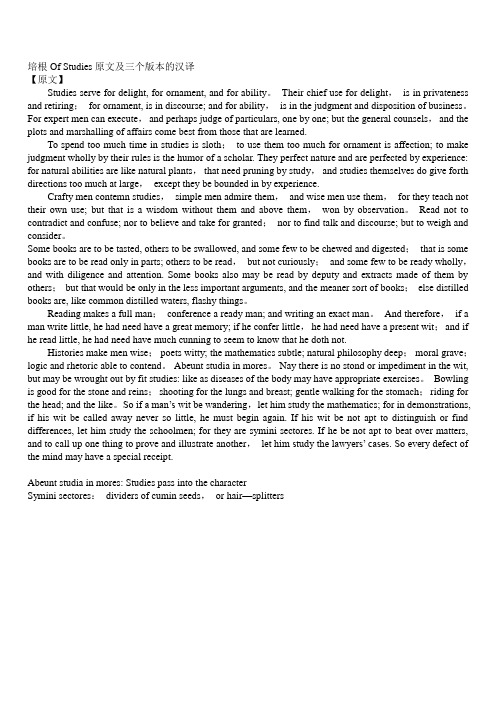
培根Of Studies原文及三个版本的汉译【原文】Studies serve for delight, for ornament, and for ability。
Their chief use for delight,is in privateness and retiring;for ornament, is in discourse; and for ability,is in the judgment and disposition of business。
For expert men can execute,and perhaps judge of particulars, one by one; but the general counsels,and the plots and marshalling of affairs come best from those that are learned.To spend too much time in studies is sloth;to use them too much for ornament is affection; to make judgment wholly by their rules is the humor of a scholar. They perfect nature and are perfected by experience: for natural abilities are like natural plants,that need pruning by study,and studies themselves do give forth directions too much at large,except they be bounded in by experience.Crafty men contemn studies,simple men admire them,and wise men use them,for they teach not their own use; but that is a wisdom without them and above them,won by observation。
培根散文Of Studies及其译文的赏析

培根散文 O t i 及其译 文的赏析 f ue Sds
陈海伦 王 占斌
( 天津商业大学 外国语学 院 , 天津 3 o3) 0 14
摘
要 :f m e 《 读 书》是 英 国著 名哲 学 家、 O d s(论 Si ) 文学 家 弗 朗西斯 ・ 培根 的传 世佳 作 , 文 风 其
典雅 明快 、 言凝 练 简洁、 辞 生动 形 象 ,警 句迭 出、 语 修 寓意 深刻 。从探 讨原 文作 者 的语 言风 格 和 文体修辞 入手 , 对王佐 良先 生 经典译 文 中的一些译例 进行 了鉴 赏分析 , 示 了王佐 良先 生的 展
有节 奏感 , 来 朗朗上 口。文 中多用 排 比和 比喻 , 言警句 更 是层 出不 穷 , 读 格 言简 意 赅 , 服力 强 , 称论 说 堪 说散 文 的典 范 , 在语 言风 格上 有如下 一些 特点 : 1用词 典雅庄重 .
O Sui (论 读书》这 篇 随笔 , f td s( e ) 文字 简洁 , 中大 量古 语词 (r a m) 其 a hi 的使 用 承 载 了历史 的厚 重 , c s 颇 具文 化韵 味 , 就像古 汉语 中“ 之乎 者 也 ” 词 汇一 样具 有 特定 历 史时 期 的语 言 色彩 , 文 章显 得 庄 重 、 等 使 文
二 、 文简洁 明快 、 劲苍 幽 原 遒
O t i (论读 书》是 培根 40年前撰 写 的一篇探讨 读书 问题 的散文 杂记 , fu e 《 Sds ) 0 也是英 国文学 中妇孺 皆
知 的劝 学名篇 。该文 笔力遒 劲苍 幽 , 想 精 深悠 远 , 思 行文 简 洁 明快 , 论述 深 入 浅 出 , 析桴 鼓相 应 , 来 分 读
r e t ny ecp e i a xet cp
ofstudy原文及翻译

ofstudy原文及翻译Studies serve for delight, for ornament, and for ability. Their chief use for delight, is in privateness and retiring; for ornament, is in discourse; and for ability, is in the judgment, and disposition of business. For expert men can exe-cute, and perhaps judge of particulars, one by one; but the general counsels, and the plots and marshalling of affairs, come best, from those that are learned. To spend too much time in studies is sloth; to use them too much for ornament, is affectation; to make judgment wholly by their rules, is the humor of a scholar. They perfect nature, and are perfected by experience: for natural abilities are like natural plants, that need proyning, by study; and studies themselves, do give forth directions too much at large, except they be bounded in by experience. Crafty men contemn studies, simple men admire them, and wise men use them; for they teach not their own use; but that is a wisdom without them, and above them, won by observation. Read not to contradict and confute; nor to believe and take for granted; nor to find talk and discourse; but to weigh and consider. Some books are to be tasted, others to be swallowed, and some few to be chewed and digested; that is, some books are to be read only in parts; others to be read, but not curiously; and some few to be read wholly, and with diligence and attention. Some books also may be read by deputy, and extracts made of them bothers; but that would be only in the less important arguments, and the meaner sort of books, else distilled books are like common distilled waters, flashy things.Reading make a full man; conference a ready man; and writing an exact man. And therefore, if a man write little, he had need have a great memory; if he confer little, he had need havea present wit: and if he read little, he had need have much cunning, to seem to know, that he doth not. Histories make men wise; poets witty; the mathematics subtitle; natural philosophy deep; moral grave; logic and rhetoric able to contend. Abeunt studia in mores. Nay, there is no stand or impediment in the wit, but may be wrought out by fit studies; like as diseases of the body, may have appropriate exercises. Bowling is good for the stone and reins; shooting for the lungs and breast; gentle walking for the stomach; riding for the head; and the like. So if a man's wit be wandering, let him study the mathematics; for in demonstrations, if his wit be called away never so little, he must begin again. If his wit be not apt to distinguish or find differences, let him study the Schoolmen; for they are cymini sectors. If he be not apt to beat over matters, and to call up one thing to prove and illustrate another, let him study the lawyers' cases. So every defect of the mind, may have a special receipt.读书足以怡情, 足以博采, 足以长才。
中英文互译文章篇:OfStudies
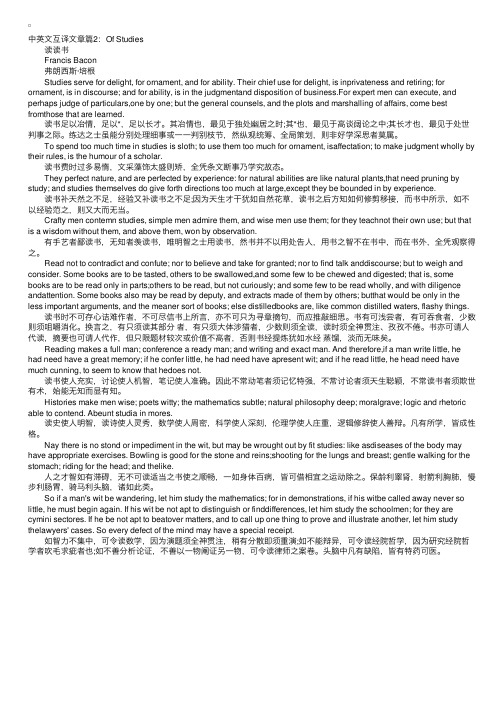
中英⽂互译⽂章篇2:Of Studies 读读书 Francis Bacon 弗朗西斯·培根 Studies serve for delight, for ornament, and for ability. Their chief use for delight, is inprivateness and retiring; for ornament, is in discourse; and for ability, is in the judgmentand disposition of business.For expert men can execute, and perhaps judge of particulars,one by one; but the general counsels, and the plots and marshalling of affairs, come best fromthose that are learned. 读书⾜以冶情,⾜以*,⾜以长才。
其冶情也,最见于独处幽居之时;其*也,最见于⾼谈阔论之中;其长才也,最见于处世判事之际。
练达之⼠虽能分别处理细事或⼀⼀判别枝节,然纵观统筹、全局策划,则⾮好学深思者莫属。
To spend too much time in studies is sloth; to use them too much for ornament, isaffectation; to make judgment wholly by their rules, is the humour of a scholar. 读书费时过多易惰,⽂采藻饰太盛则矫,全凭条⽂断事乃学究故态。
They perfect nature, and are perfected by experience: for natural abilities are like natural plants,that need pruning by study; and studies themselves do give forth directions too much at large,except they be bounded in by experience. 读书补天然之不⾜,经验⼜补读书之不⾜;因为天⽣才⼲犹如⾃然花草,读书之后⽅知如何修剪移接,⽽书中所⽰,如不以经验范之,则⼜⼤⽽⽆当。
of studies
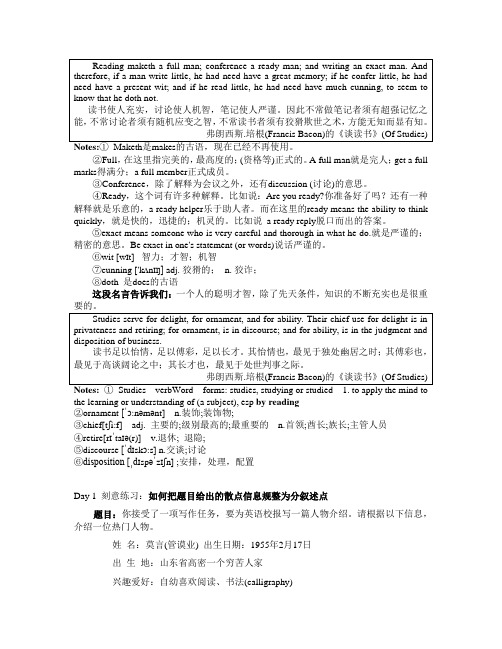
②Full,在这里指完美的,最高度的;(资格等)正式的。
A full man就是完人;get a full marks得满分;a full member正式成员。
③Conference,除了解释为会议之外,还有discussion (讨论)的意思。
④Ready,这个词有许多种解释。
比如说:Are you ready?你准备好了吗?还有一种解释就是乐意的,a ready helper乐于助人者。
而在这里的ready means the ability to think quickly,就是快的,迅捷的;机灵的。
比如说a ready reply脱口而出的答案。
⑤exact means someone who is very careful and thorough in what he do.就是严谨的;精密的意思。
Be exact in one's statement (or words)说话严谨的。
⑥wit [wɪt] 智力;才智;机智⑦cunning ['kʌnɪŋ] adj. 狡猾的;n. 狡诈;⑧doth 是does的古语这段名言告诉我们:一个人的聪明才智,除了先天条件,知识的不断充实也是很重the learning or understanding of (a subject), esp by reading②ornament [ˈɔ:nəmənt] n.装饰;装饰物;③chief[tʃi:f] adj. 主要的;级别最高的;最重要的n.首领;酋长;族长;主管人员④retire[rɪˈtaɪə(r)] v.退休; 退隐;⑤discourse[ˈdɪskɔ:s] n.交谈;讨论⑥disposition [ˌdɪspəˈzɪʃn] ;安排,处理,配置Day 1 刻意练习:如何把题目给出的散点信息规整为分叙述点题目:你接受了一项写作任务,要为英语校报写一篇人物介绍。
请根据以下信息,介绍一位热门人物。
Of Study培根论读书原文+翻译
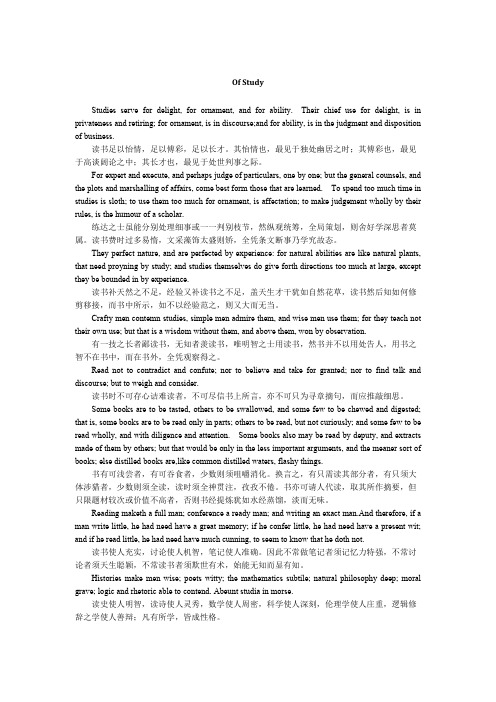
Of StudyStudies serve for delight, for ornament, and for ability. Their chief use for delight, is in privateness and retiring; for ornament, is in discourse;and for ability, is in the judgment and disposition of business.读书足以怡情,足以傅彩,足以长才。
其怡情也,最见于独处幽居之时;其傅彩也,最见于高谈阔论之中;其长才也,最见于处世判事之际。
For expert and execute, and perhaps judge of particulars, one by one; but the general counsels, and the plots and marshalling of affairs, come best form those that are learned. To spend too much time in studies is sloth; to use them too much for ornament, is affectation; to make judgement wholly by their rules, is the humour of a scholar.练达之士虽能分别处理细事或一一判别枝节,然纵观统筹,全局策划,则舍好学深思者莫属。
读书费时过多易惰,文采藻饰太盛则矫,全凭条文断事乃学究故态。
They perfect nature, and are perfected by experience: for natural abilities are like natural plants, that need proyning by study; and studies themselves do give forth directions too much at large, except they be bounded in by experience.读书补天然之不足,经验又补读书之不足,盖天生才干犹如自然花草,读书然后知如何修剪移接,而书中所示,如不以经验范之,则又大而无当。
- 1、下载文档前请自行甄别文档内容的完整性,平台不提供额外的编辑、内容补充、找答案等附加服务。
- 2、"仅部分预览"的文档,不可在线预览部分如存在完整性等问题,可反馈申请退款(可完整预览的文档不适用该条件!)。
- 3、如文档侵犯您的权益,请联系客服反馈,我们会尽快为您处理(人工客服工作时间:9:00-18:30)。
O f s t u d i e s原文译文及赏析培根Of Studies原文及三个版本的汉译【原文】Studies serve for delight, for ornament, and for ability. Their chief use for delight, is in privateness and retiring; for ornament, is in discourse; and for ability, is in the judgment and disposition of business. For expert men can execute, and perhaps judge of particulars, one by one; but the general counsels, and the plots and marshalling of affairs come best from those that are learned.To spend too much time in studies is sloth; to use them too much for ornament is affection; to make judgment wholly by their rules is the humor of a scholar. They perfect nature and are perfected by experience: for natural abilities are like natural plants, that need pruning by study, and studies themselves do give forth directions too much at large, except they be bounded in by experience.Crafty men contemn studies, simple men admire them, and wise men use them, for they teach not their own use; but that is a wisdom without them and above them, won by observation. Read not to contradict and confuse; nor to believe and take for granted; nor to find talk and discourse; but to weigh and consider.Some books are to be tasted, others to be swallowed, and some few to be chewed and digested; that is some books are to be read only in parts; others to be read, but not curiously; and some few to be ready wholly, and with diligence and attention. Some books also may be read by deputy and extracts made of them by others; but that would be only in the less important arguments, and the meaner sort of books; else distilled books are, like common distilled waters, flashy things.Reading makes a full man; conference a ready man; and writing an exact man. And therefore, if a man write little, he had need have a great memory; if he confer little, he had need have a present wit; and if he read little, he had need have much cunning to seem to know that he doth not.Histories make men wise; poets witty; the mathematics subtle; natural philosophy deep; moral grave; logic and rhetoric able to contend. Abeunt studia in mores. Nay there is no stond or impediment in the wit, but may be wrought out by fit studies: like as diseases of the body may have appropriate exercises. Bowling is good for the stone and reins; shooting for the lungs and breast; gentle walking for the stomach; riding for the head; and the like. So if a man’s wit be wandering, let him study the mathematics; for in demonstrations, if his wit be called away never so little, he must begin again. If his wit be not apt to distinguish or find differences, let him study the schoolmen; for they are symini sectores. If he be not apt to beat over matters, and to call up one thing to prove and illustrate another, let him study the lawyers’ cases. So every defect of the mind ma y have a special receipt.Abeunt studia in mores: Studies pass into the characterSymini sectores: dividers of cumin seeds, or hair-splitters【译文】一、王佐良译:谈读书读书足以怡情, 足以傅彩, 足以长才。
其怡情也,最见于独处幽居之时;其傅彩也,最见于高谈阔论之中;其长才也,最见于处世判事之际.练达之士虽能分别吃力细事或一一判别枝节,然纵观统筹、全局策划,则舍好学深思者莫属.读书费时过多易惰,文采藻饰太盛则矫,全凭条文断事乃学究故态.读书补天然之不足,经验又补读书之不足,盖天生才干犹如自然花草,读书然后知如何修剪移接;而书种所示,如不以经验范之,则又大而无当。
有一技之长鄙读书,无知者慕读书,唯明智之士用读书,然读书并不以用处告人,用书之智不在书种,而在书外,全凭观察得之.读书时不可存心诘难作者,不可尽信书上所言,亦不可只为寻章摘句,而应推敲细思。
书有课浅尝者,有可吞食者,少数则须咀嚼消化.换言之,有只须读其部分者,有只须大体涉猎者,少数则须全读,读时须全神贯注,孜孜不倦.书亦可请人代读,取其所作摘要,但只限题材较次或价值不高者,否则书经提炼犹如水经蒸馏,淡而五味矣。
读书使人充实,讨论使人机智,笔记使人准确.因此不常做笔记者须记忆特强,不常讨论者须天生聪颖,不常读书者须欺世有术,始能无知而显有知。
读史使人明智,读诗使人灵秀,数学使人周密,科学使人深刻,论理学使人庄重,逻辑修辞之学使人善辨:凡有所学,皆成性格.人之才智但有滞碍,无不可读适当之书使之顺畅,一如身体百病,皆可借相宜之运动除之.滚球利睾肾,射箭利胸肺,慢步利肠胃,骑术利头脑,诸如此类.如智力不集中,可令读数学,盖演算须全神贯注,稍有分散即须重演;如不能辨异,可令读经院哲学,盖是辈皆吹毛求疵之人;如不善求同,不善以一物阐证另一物,可令读律师之案卷.如此头脑中凡有缺陷,皆有特药可医.二、廖运范译文论读书读书能给人乐趣、文雅和能力.人们独居或退隐的时候,最能体会到读书的乐趣;谈话的时候,最能表现出读书的文雅;判断和处理事务的时候,最能发挥由读书而获得的能力.那些有实际经验而没有学识的人,也许能够一一实行或判断某些事物的细微末节,但对于事业的一般指导、筹划与处理,还是真正有学问的人才能胜任.耗费过多的时间去读书便是迟滞,过分用学问自炫便是矫揉造作,而全凭学理判断一切,则是书呆子的癖好.学问能美化人性,经验又能充实学问.天生的植物需要人工修剪,人类的本性也需要学问诱导,而学问本身又必须以经验来规范,否则便太迂阔了.技巧的人轻视学问,浅薄的人惊服学问,聪明的人却能利用学问.因为学问本身并不曾把它的用途教给人,至于如何去应用它,那是在学问之外、超越学问之上、由观察而获得的一种聪明呢!读书不是为着药辩驳,也不是要盲目信从,更不是去寻找谈话的资料,而是要去权衡和思考.有些书只需浅尝,有些书可以狼吞,有些书要细嚼慢咽,漫漫消化.也就是说,有的书只需选读,有的书只需浏览,有的书却必须全部精读.有些书不必去读原本,读读它们的节本就够了,但这仅限于内容不大重要的二流书籍:否则,删节过的往往就像蒸馏水一样,淡而无味.读书使人渊博,论辨使人机敏,写作使人精细.如果一个人很少写作,他就需要有很强的记忆力;如果他很少辩论,就需要有机智;如果他很少读书,就需要很狡猾,对于自己不懂的事情,假装知道.历史使人聪明,诗歌使人富于想象,数学使人精确,自然哲学使人深刻,伦理学使人庄重,逻辑学和修辞学使人善辩.总之,读书能陶冶个性.不仅如此,读书并且可以铲除一切心理上的障碍,正如适当的运动能够矫治身体上的某些疾病一般.例如,滚球有益于肾脏;射箭有益于胸肺;散步有益于肠胃;骑马有益于头脑等等.因此,假若一个人心神散乱,最好让他学习数学,因为在演算数学题目的时候,一定得全神贯注,如果注意力稍一分散,就必须得再从头做起.假若一个人拙于辨别差异,就让他去请教那些演绎派的大师们,因为他们正是剖析毫发的人.假若一个人心灵迟滞,不能举一反三,最好让他去研究律师的案件.所以每一种心理缺陷,都有一种特殊的补救良方.三、孙有中译文论学习学习可以作为消遣,作为装点,也可以增进才能.其为消遣之用,主在独处、归休之时;为装点,则在高谈阔论之中;为才能,则在明辨是非、深谋远虑之间;因为专于一技者可以操持甚或判断一事一物,而唯有博学之士方能纵观全局,通权达变。
